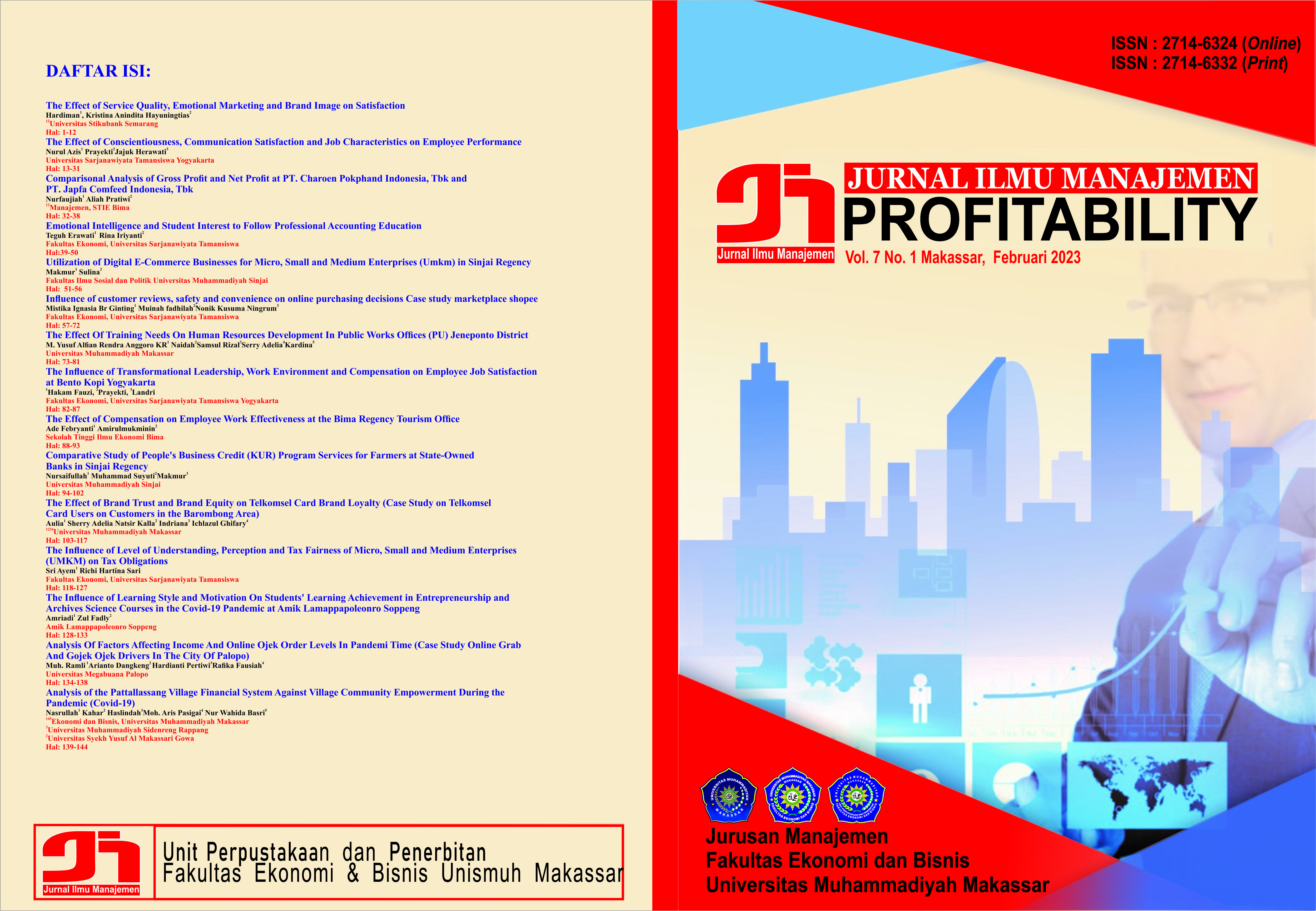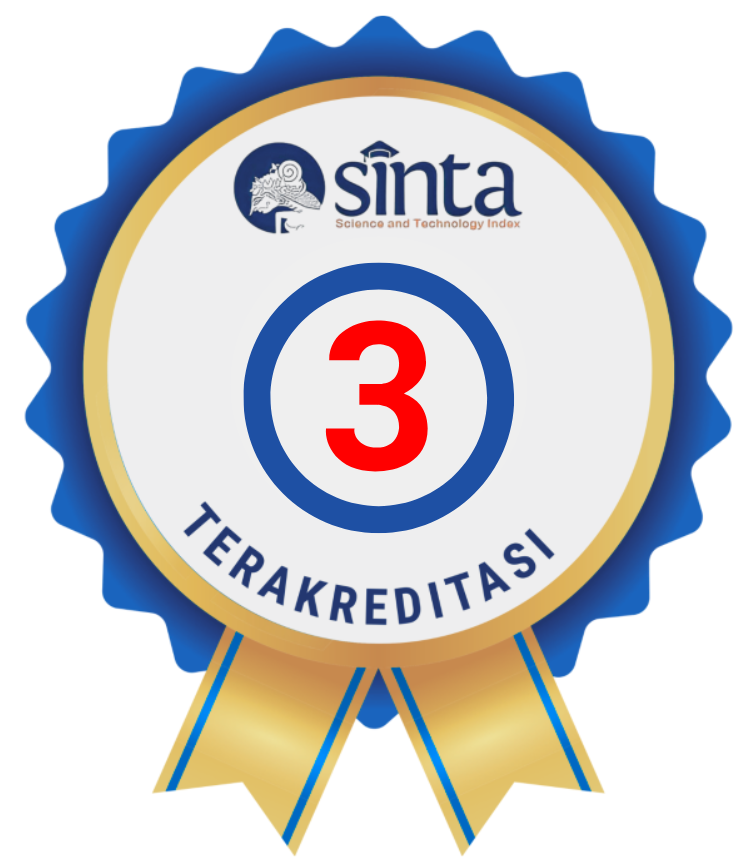Emotional Intelligence and Student Interest to Follow Professional Accounting Education
DOI: https://doi.org/10.26618/profitability.v7i1.10239
Emotional Intelligence, Attitude, Quality Motivation, Career Motivation, Economic Motivation, And Interest
Abstract
Emotional intelligence, attitude, quality motivation, career motivation, and economic motivation all play a role in accounting students' interest in taking the Accounting Profession Education (APE) program, according to this study (PPAk). This is a survey study using a causal comparative quantitative method. this type of study. Among the characteristics being studied are accounting students' interest in the Accounting Profession Education, as well as their emotional intelligence, attitude, and quality motivation (PPAk). At the Faculty of Economics, the University of Sarjanawiyata Tamansisw, students who have undergone auditing courses are included in the population. Convenience Sampling Method of Sampling. Questionnaires will be used to gather data for this project. With a 5% level of significance, multiple linear regression is utilized in the study. The results in this study indicate that emotional intelligence, attitude, quality motivation, career motivation, and economic motivation partially have a positive and significant effect on the interest of accounting students to take the Accounting Profession Education (PPAk). Simultaneously emotional intelligence, attitude, quality motivation, career motivation, and economic motivation have a positive and significant effect on the interest of accounting students to take the Accounting Profession Education (PPAk).
References
Agustina, Ruslinda, and Jamida Yuli. 2016. “Pengaruh Motivasi Terhadap Minat Mahasiswa Akuntansi Di Banjarmasin Untuk Mengikuti Pendidikan Profesi Akuntansi (Studi Kasus: PTS Dan PTN).” Dinamika Ekonomi Jurnal Ekonomi dan Bisnis 9(2): 129–44.
Aryani, Ni, and Ni Erawati. 2016. “Pengaruh Motivasi Kualitas, Karir, Ekonomi, Dan Biaya Pendidikan Pada Minat Mahasiswa Mengikuti Pendidikan Profesi Akuntansi.” E-Jurnal Akuntansi 16(1): 362–87.
Astasari, Adisti. 2018. “Analisis Faktor-Faktor Yang Mempengaruhi Minat Mahasiswa Akuntansimemilih Karir Sebagai Akuntan Publik (Studi Pada Mahasiswa Juruan Akuntansi Di Universitas Islam Indonesia Daerah Istimewa Yogyakarta).” Skripsi Universitas Islam Yogyakarta: 1–182.
Emosional, Pengaruh Kecerdasan et al. 2017. “Pengaruh Kecerdasan Emosional, Norma Subjektif, Dan Kontrol Perilaku Pada Minat Berkarir Mahasiswa Pendidikan Profesi Akuntansi.” E-Jurnal Akuntansi 20(2): 1016–45.
Fatmawati, Ira Veronika, Fakultas Ekonomi, and Universitas Pgri. 2012. “Pengaruh Motivasi Terhadap Minat Mahasiswa Akuntansi Mengikuti Pendidikan Profesi Akuntansi (PPAk) Ira Veronika Fatmawati Fakultas Ekonomi Universitas PGRI Yogyakarta.”
goleman, daniel; boyatzis, Richard; Mckee, Annie. 2019. “済無No Title No Title.” Journal of Chemical Information and Modeling 53(9): 1689–99.
Kepribadian, Pengaruh et al. 2021. “Terhadap Minat Mahasiswa Mengikuti Pendidikan Profesi Akuntansi ( Ppak ) Terhadap Minat Mahasiswa Mengikuti Pendidikan Profesi Akuntansi ( PPAk ).”
Natami, Ni Made Anita Dewi, and Ketut Muliartha. 2019. “Pengaruh Sikap Dan Motivasi Terhadap Minat Mahasiswa Untuk Mengikuti Pendidikan Profesi Akuntan (PPAk).” E-Jurnal Akuntansi 27: 1678.
Nisa, Sayyidatun. 2019. “Mahasiswa Akuntansi Untuk Mengambil Profesi Chartered Accountant (CA) Pada Universitas Islam Swasta Di Kota Medan.” Jurnal Riset Akuntansi Multiparadigma (JRAM) 6(1): 64–73.
Noe, Raymond A., Hollenbeck, John R., Gerhart, Barry., & Wright, Patrick M. 2010. Manjemen Sumber Daya Manusia: Mencapai Keunggulan Bersaing. Edisi 6, J. Jakarta: Salemba Empat.
Putri, NPNDE, Anik Yuesti, and IM Sudiatana. 2019. “Pengaruh Motivasi Dan Kecerdasan Emosional Terhadap Minat Mahasiswa Akuntansi Untuk Mengikuti Pendidikan Profesi Akuntansi (PPAk) (Studi Empiris Pada Mahasiswa Prodi Akuntansi, Universitas Mahasaraswati Denpasar).” Jurnal Sains, Akuntansi dan Manajemen 1(2): 151–87.
Rivai Veithzal. 2016. Manajemen Sumber Daya Manusia Untuk Perusahaan Dari Teori Ke Praktik. Jakarta: Raja Grafindo Persada.
Saifudin, Saifudin, and Bella Fazrine Darmawan. 2020. “Pengaruh Motivasi Terhadap Minat Mahasiswa Akuntansi Mengikuti Program Brevet Pajak (Studi Kasus Pada Mahasiswa PTS Di Semarang Tahun 2019).” Jemap 2(2): 216.
Sugiono. 2016. “Pengaru Kecerdasan, Motivasi Dan Perilaku Belajar Terhadap Pemilihan Karir Mahsiswa Akuntansi.” Cendikia Akuntansi 4(3): 16–36.
sugiono. 2018. Metode Penelitian Kuantitatif, Kualitatif, Dan R & D.
Vesperalis, Anak Agung Ayu Dewi, and Ketut RM Muliartha. 2017. “Pengaruh Motivasi Pada Minat Sarjana Akuntansi Universitas Udayana Untuk Mengikuti PPAk.” E-Jurnal Akuntansi Universitas Udayana 19(2): 1691–1718.
Wijayanto, Sigit Ary, Bella Permata Ayu, and Muhammad Wahyullah. 2020. “Pengaruh Motivasi, Sikap Dan Persepsi Mahasiswa Tentang Pendidikan Profesi Akuntansi Terhadap Minat Menjadi Akuntan Perusahaan Pada Mahasiswa Jurusan Akuntansi Sekolah Tinggi Ilmu Ekonomi Amm Mataram.” Jurnal Bina Bangsa Ekonomika 13(01): 175–83
Downloads
Published
Issue
Section
License
Authors who publish with Jurnal Ilmu Manajemen Profitability agree to the following terms:
Copyright of the articles remains with the authors.
Authors grant the journal the right of first publication with the work simultaneously licensed under a Creative Commons Attribution-NonCommercial 4.0 International License (CC BY-NC 4.0). This license allows others to:
Share (copy and redistribute the material in any medium or format)
Adapt (remix, transform, and build upon the material)
as long as they give appropriate credit to the original author(s) and source, provide a link to the license, and indicate if changes were made. Non-commercial use only.
Authors are permitted to:
Distribute their published work (e.g., post it to an institutional repository or publish it in a book), with an acknowledgment of its initial publication in this journal.
Enter into separate, additional contractual arrangements for the non-exclusive distribution of the journal’s published version of the work (e.g., post it to a class website or institutional archive).
For permissions to use the content published in this journal beyond the scope of the license (e.g., commercial purposes), please contact the editorial office via the journal email.
License Details:
This journal is licensed under a Creative Commons Attribution-NonCommercial 4.0 International License (CC BY-NC 4.0).












